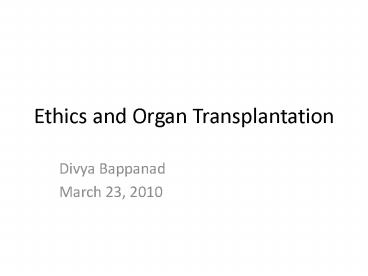Ethics and Organ Transplantation - PowerPoint PPT Presentation
1 / 19
Title:
Ethics and Organ Transplantation
Description:
History of Organ Transplant 1954 living relating kidney transplant ... 1967 liver transplant( Dr. Thomas Starzl Colorado) and heart transplant ... – PowerPoint PPT presentation
Number of Views:2982
Avg rating:3.0/5.0
Title: Ethics and Organ Transplantation
1
Ethics and Organ Transplantation
- Divya Bappanad
- March 23, 2010
2
History of Organ Transplant
- 1954 living relating kidney transplant( Dr.
Joseph Murray and Dr. David Hume Boston) - 1962 cadaveric kidney transplant by (Dr. Joseph
Murray and Dr. David Hume Boston) - 1963 lung transplant (Dr. James Hardy
Mississippi) - 1967 liver transplant( Dr. Thomas Starzl
Colorado) and heart transplant(Dr. Christiaan
Barnard South Africa) - 1981 heart/lung transplant(Dr. Norman Shumway
California) - 1983 FDA approves cyclosporin
3
Guiding Principles in Medical Ethics
- Autonomy
- The right of individuals to self-determination
- Beneficence
- Physicians should act in the best interest of
their patients - Non-maleficence
- Physicians should not cause harm to their
patients - Justice
- Fairness and equality
4
Increasing Organ Donation
- Limited Resource
- Cadaveric Organs
- Mandated Choice
- Presumed Consent
- Incentives
- Prisoners
5
Consent
- Presumed consent
- Explicit Consent
- Informed consent
6
Informed Consent
- Diagnosis
- Nature and purpose of treatment
- Risks and benefits of treatment
- Alternatives
- Risks and benefits
- Risks and benefits of not having treatment
7
Increasing Organ Donation
- Living Donors
- Buying and selling of organs
- Unfair pressure on economically disadvantaged
- Wealthy people have unfair access
- Donor and recipient safety
8
Organ allocation
- Limited resource
- Distributive justice
- How to fairly divide resources
- Equal access
- Maximum benefit
9
Distributive Justice
- Equal Access
- Everyone should be able to access it equally
- Length of Time
- Age of recipient
- Reasons for equal access exclude individual
worth from equation - Exclude Medical worthiness i.e. smoking or ETOH
use - Exclude Social worthiness i.e. prisoners
10
Distributive Justice
- Maximum benefit
- Maximize the number of successful transplants
- Medical need
- Probability of success
- Reasons for maximum benefit limited resource and
should avoid waste - Second transplant
- Factor in medical outcome
11
Current Organ Distribution System
- Medical need
- Probability of Success
- Time on Waiting List
12
WHO Guiding Principle 1
- Autonomy
- Cells, tissues and organs may be removed from the
bodies of deceased persons for the purpose of
transplantation if - (a) any consent required by law is obtained, and
- (b) there is no reason to believe that the
deceased person objected to such removal.
13
WHO Guiding Principle 2
- Beneficence
- Physicians determining that a potential donor has
died should not be directly involved in cell,
tissue or organ removal from the donor or
subsequent transplantation procedures nor should
they be responsible for the care of any intended
recipient of such cells, tissues and organs.
14
WHO Guiding Principle 3
- Autonomy, Non-maleficence, Justice
- In general living donors should be genetically,
legally or emotionally related to their
recipients. - Informed, voluntary consent
- Professional follow up ensured and organized
- Selection criteria
- Non coercive
15
WHO Guiding Principle 4
- Non-maleficence
- Minors and legally incompetent people
- No cells, tissues or organs should be removed
from the body of a living minor for the purpose
of transplantation other than narrow exceptions
allowed under national law. - Specific measures should be in place to protect
the minor and, wherever possible the minors
assent should be obtained before donation.
16
WHO Guiding Principle 5, 6, and 8
- Beneficence
- Cells, tissues and organs should only be donated
freely without any monetary payment or reward of
monetary value. - The prohibition on sale or purchase of cells,
tissues and organs does not preclude reimbursing
reasonable and verifiable expenses incurred by
the donor, including loss of income, or paying
the costs of recovering, processing, preserving
and supplying human cells, tissues or organs for
transplantation.
17
WHO Guiding Principle 7
- Non-maleficence
- Physicians and other health professionals should
not engage in transplantation procedures, and
health insurers and other payers should not cover
such procedures, if the cells, tissues or organs
concerned have been obtained through exploitation
or coercion of, or payment to, the donor or the
next of kin of a deceased donor.
18
WHO Guiding Principle 9
- Justice
- The allocation of organs, cells and tissues
should be guided by clinical criteria and ethical
norms, not financial or other considerations. - Allocation rules, defined by appropriately
constituted committees, should be equitable,
externally justified, and transparent.
19
Citations
- Informed Consent. American Medical Associationlt
http//www.ama-assn.org/ama/pub/physician-resource
s/legal-topics/patient-physician-relationship-topi
cs/informed-consent.shtmlgt - WHO Guiding Principles on Human Cell, Tissue and
Organ Transplantationlt http//www.searo.who.int/Li
nkFiles/BCT_WHO_guiding_principles_organ_transplan
tation.pdfgt 26 May 2008.































